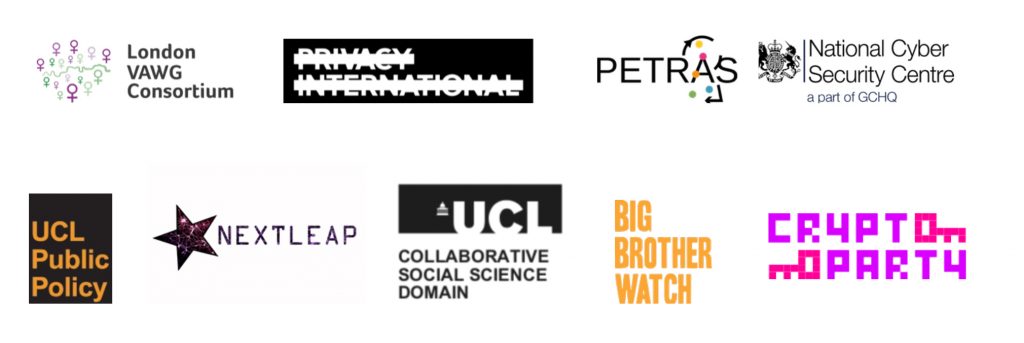In late November, UCL’s “Gender and IoT” (G-IoT) research team ran a “CryptoParty” (digital security training event) followed by a panel discussion which brought together frontline workers, support organisations, as well as policy and tech representatives to discuss the risk of emerging technologies for domestic violence and abuse. The event coincided with the International Day for the Elimination of Violence against Women, taking place annually on the 25th of November.
Technologies such as smartphones or platforms such as social media websites and apps are increasingly used as tools for harassment and stalking. Adding to the existing challenges and complexities are evolving “smart”, Internet-connected devices that are progressively populating public and private spaces. These systems, due to their functionalities, create further opportunities to monitor, control, and coerce individuals. The G-IoT project is studying the implications of IoT-facilitated “tech abuse” for victims and survivors of domestic violence and abuse.
CryptoParty
The evening represented an opportunity for frontline workers and support organisations to upskill in digital security. Attendees had the chance to learn about various topics including phone, communication, Internet browser and data security. They were trained by a group of so-called “crypto angels”, meaning volunteers who provide technical guidance and support. Many of the trainers are affiliated with the global “CryptoParty” movement and the CryptoParty London specifically, as well as Privacy International, and the National Cyber Security Centre.
G-IoT’s lead researcher, Dr Leonie Tanczer, highlighted the importance of this event in light of the socio-technical research that the team pursued so far: “Since January 2018, we worked closely with the statutory and voluntary support sector. We identified various shortcomings in the delivery of tech abuse provisions, including practice-oriented, policy, and technical limitations. We set up the CryptoParty to bring together different communities to holistically tackle tech abuse and increase the technical security awareness of the support sector.”
Tanczer stressed the innovative spin and replicability of this event: “While this was probably a first for many of the people involved, I am hopeful that the gathered knowledge and established networks will remain far beyond our research project, and I am incredibly thankful for all the support we have received from all the diverse stakeholders that made this event possible.”
Panel discussion
A panel discussion, moderated by BBC journalist Shari Vahl, followed the digital security workshop. Speakers included Vivienne Hayes (Women’s Resource Centre), Andrew Laughlin (Which?), Leonie Tanczer (UCL), and Martin Sadler (DCMS Secure by Design Expert Advisory Group).
Panellists explored the perils different technologies create in domestic violence and abuse situations and specifically discussed tech abuse in light of the rising uptake of IoT systems and the move towards a so-called “smart home”. Speakers also touched upon the potential future steps government, industry, and support organisations may take to mitigate these pressing risks.
Vivienne Hayes, CEO of the Women’s Resource Centre pointed out the need for more public awareness and resources for the support sector: “Men who enact violence against women don’t do this in random reactive ways. It’s not just reactive – it’s planned and controlling. They use whatever means at their disposal to abuse and control women and their children. And technology is another means by which perpetrators can abuse women. Technology is booming, it’s everchanging … we need a public campaign and resources for the sector to deal with this.”
Andrew Laughlin, Principal Researcher from the consumer organisation Which? echoed this and said: “With any connections to the Internet you’ve got risks. The amount of these devices that will be sold this Christmas will probably be massive. And these products may be brought to market in a rush and without consideration of security. It’s going to take a lot of pressure; the landscape is moving really fast. Secure by design has to start with the manufacturers, not with the consumers.”
Martin Sadler, Chair of DCMS’ Secure by Design Expert Advisory Group and Former VP for Research and Lab Director, Hewlett Packard Enterprise provided his perspective on the state of the tech industry and emphasised: “The opportunity for abuse through technology is getting bigger all the time, and we don’t know how to address this gap. It is very hard when other adults have access to the same devices in the home. Organisations have created a model where anyone in the home is good anyone out is not. This certainly doesn’t work with domestic abuse, and we need a lot of people working on this. We can start by taking the conversations we’ve had today and amplify them across the country.”
Report and policy recommendations released
The G-IoT research team also used the event to release a new report summarising some of the research findings and recommendations aimed at statutory and voluntary support services, tech vendors, and policy officials, and an information leaflet aimed at policy officials.
More information about G-IoT, the research team, and its project partners can be found on the research project website.
A special thanks for the kind support goes to the following organisations:

The original version of this post appeared on the UCL STEaPP blog.